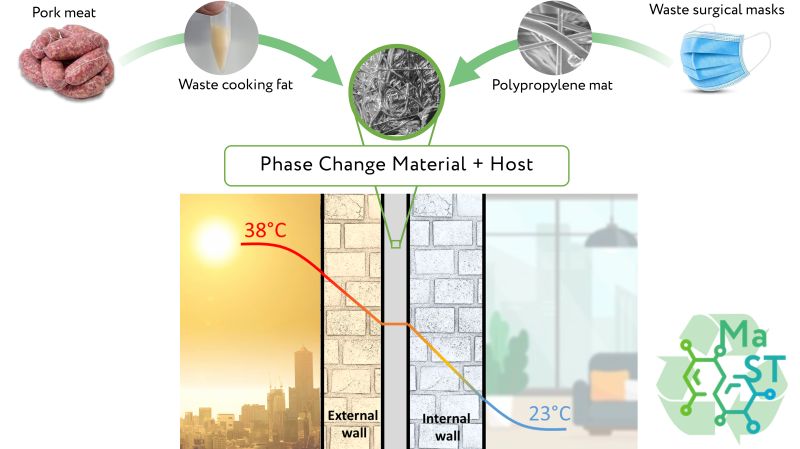Our latest work on sustainable and bio-based materials has just been published on Elsevier’s Materials Today Sustainability!
In our research, we investigate the use of waste pork fat from the cooking process as Phase Change Material confined in host materials derived from polypropylene mats from used surgical masks and bio-silica from diatoms algae. The resulting materials are suitable to be used for the passive cooling of buildings by absorbing incoming heat during the day and releasing it during the night.
Check out the paper on the journal website.
Abstract
In this paper, waste fat deriving from the cooking process of pork sausages has been studied as a sustainable phase change material (PCM). The waste fat is composed of saturated and unsaturated fatty acids and presents melting point and melting enthalpy values of 32°C and 20 J/g respectively. The BioPCM was confined in two different hosts, namely (i) biosilica (diatomite) and (ii) polypropylene non-woven mat coming from surgical mask filter waste. Both hosts are effective in entrapping high quantity of BioPCM (i.e. 65-75%) maintaining its physical and thermal properties. A simplified analytical model has been developed to analyse the use of the BioPCM in building passive cooling application simulating the thermal behaviour of a building wall containing the BioPCM confined in the hosts. A transmitted thermal power per unit area of 10.2 W/m2 was obtained. This value is 37% less of transmitted thermal power calculated for the wall without the BioPCM (16.2 W/m2), confirming that waste cooking fat can be an effective eco-sustainable solution in a good practice of circular economy.
https://www.sciencedirect.com/science/article/pii/S2589234723001409?via%3Dihub


